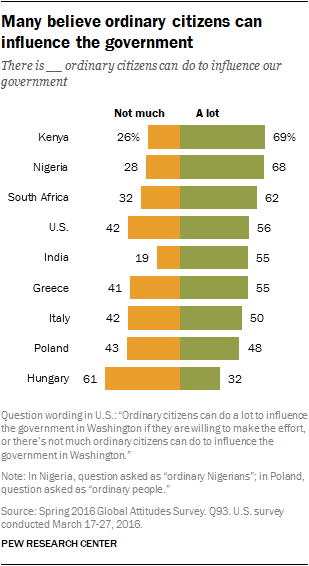Survey by Pew Global: “Signs of political discontent are increasingly common in many Western nations, with anti-establishment parties and candidates drawing significant attention and support across the European Union and in the United States. Meanwhile, as previous Pew Research Center surveys have shown, in emerging and developing economies there is widespread dissatisfaction with the way the political system is working.
 As a new nine-country Pew Research Center survey on the strengths and limitations of civic engagement illustrates, there is a common perception that government is run for the benefit of the few, rather than the many in both emerging democracies and more mature democracies that have faced economic challenges in recent years. In eight of nine nations surveyed, more than half say government is run for the benefit of only a few groups in society, not for all people.1
As a new nine-country Pew Research Center survey on the strengths and limitations of civic engagement illustrates, there is a common perception that government is run for the benefit of the few, rather than the many in both emerging democracies and more mature democracies that have faced economic challenges in recent years. In eight of nine nations surveyed, more than half say government is run for the benefit of only a few groups in society, not for all people.1
However, this skeptical outlook on government does not mean people have given up on democracy or the ability of average citizens to have an impact on how the country is run. Roughly half or more in eight nations – Kenya, Nigeria, South Africa, the U.S., India, Greece, Italy and Poland – say ordinary citizens can have a lot of influence on government. Hungary, where 61% say there is little citizens can do, is the lone nation where pessimism clearly outweighs optimism on this front.
Many people in these nine nations say they could potentially be motivated to become politically engaged on a variety of issues, especially poor health care, poverty and poor-quality schools. When asked what types of issues could get them to take political action, such as contacting an elected official or taking part in a protest, poor health care is the top choice among the six issues tested in six of eight countries. Health care, poverty and education constitute the top three motivators in all nations except India and Poland….(More)